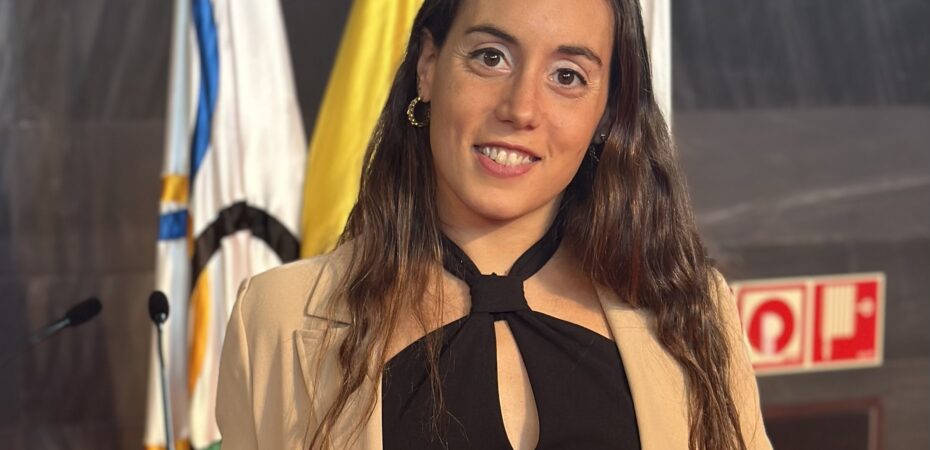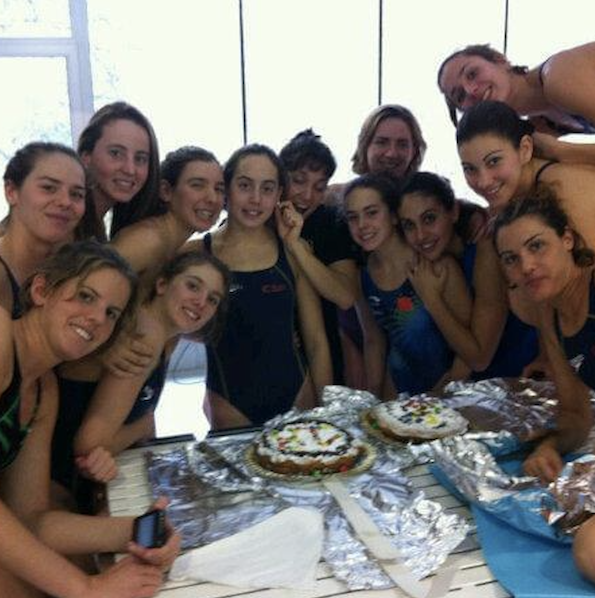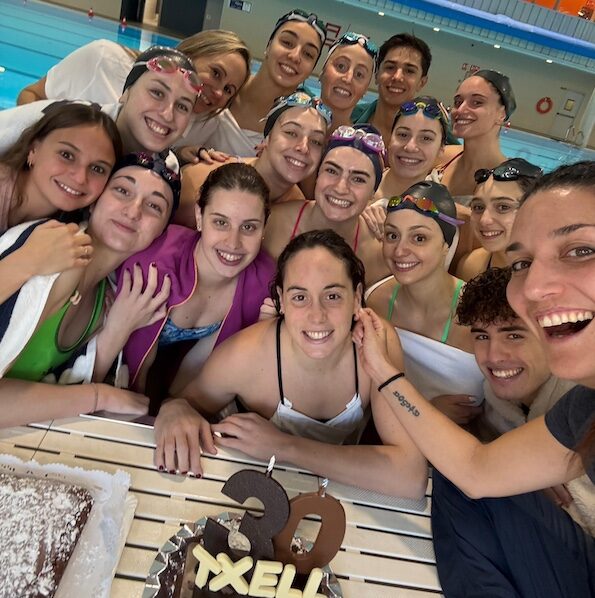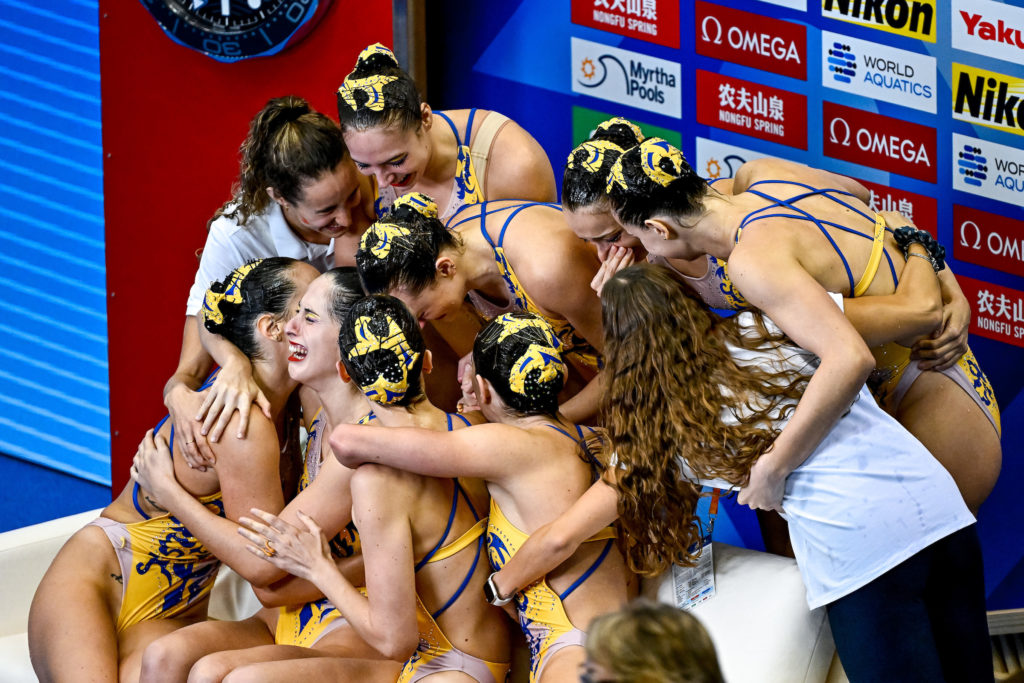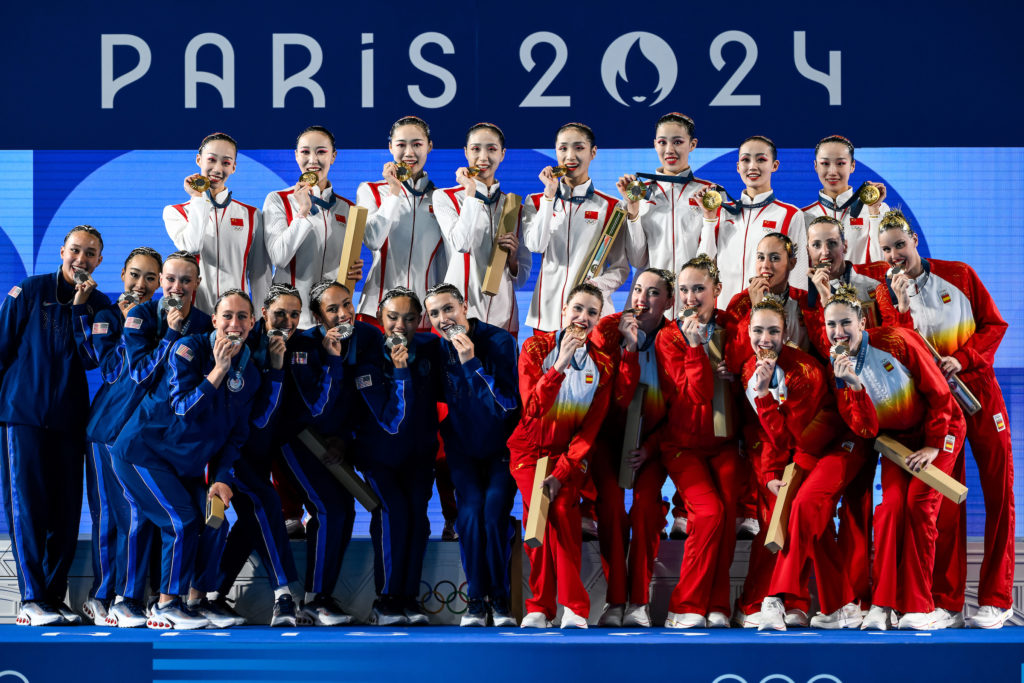Meritxell “Txell” Mas Pujadas has been one of the most enduring and dependable athletes in artistic swimming over the past decade. At 30 years old, the captain of Spain’s national team has spent about half her life competing at the international level, making her senior debut back in 2011 at just 16. Since then, she’s been a discreet yet constant presence in the Spanish squad through its triumphs, struggles, and rebuilding phases.
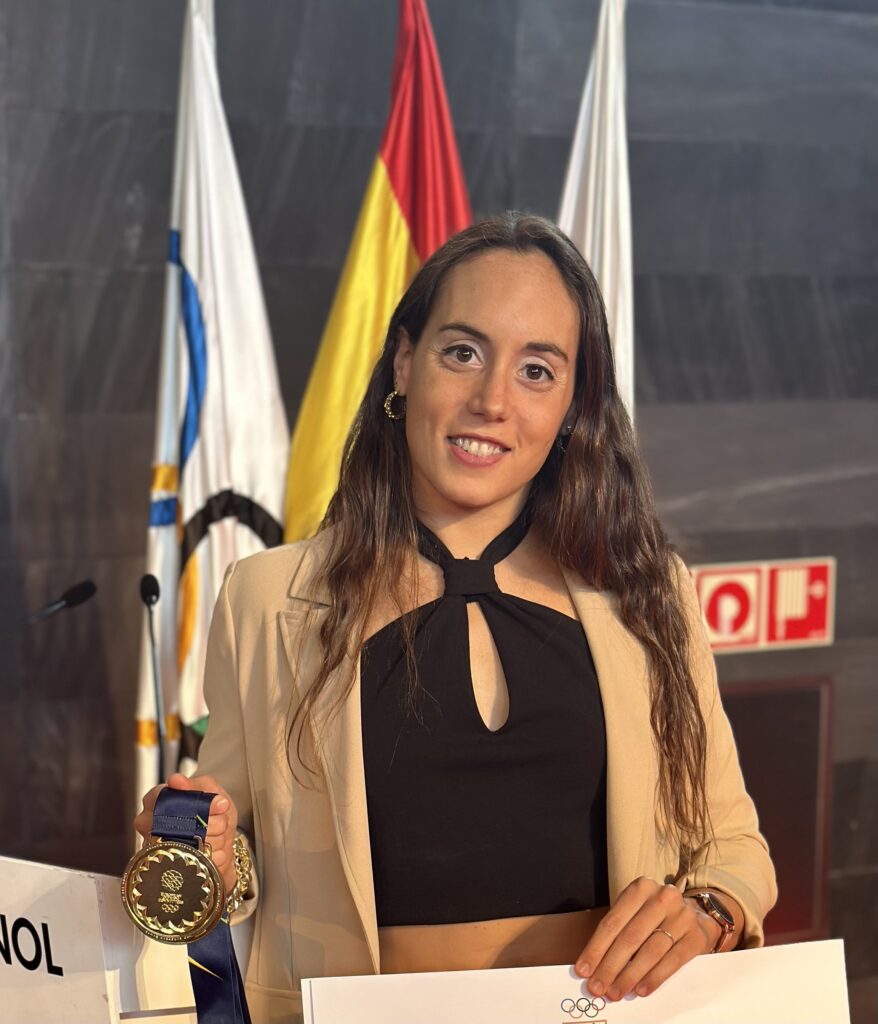
Her longevity in the sport is rare, her consistency even rarer. From a first appearance at the 2010 World Junior Championships to standing on the Olympic podium in Paris 14 years later, Mas has seemingly seen and done it all.
Year after year, she has stayed the course. There have been no breaks, no flashy displays, no long absences, no dips in her talent; just steady, focused work and an unwavering determination. During her career, she has quietly led by example, offering stability, resilience, and a sense of purpose as she anchored the team through every chapter.
We caught up with her to discuss what’s kept her going all this time, her journey from a wide-eyed junior to seasoned leader, what it means to carry Spain’s artistic swimming legacy into its next era, and her future as she settles into this new phase of her career surrounded by the people who shaped its beginning.
Inside Synchro: Txell, a few months ago, you celebrated 15 years on the Spanish national team. Congratulations!
Txell Mas: Yes, I feel really lucky to have been in the national team for 15 years. It’s crazy. If someone had told me my first year that I would be 15 years at this level, it would have seemed impossible. But, step by step, I have tried to achieve my goals. I think that’s why I have been here for such a long time. Because I wanted to achieve all of them, and that’s why I’ve kept working hard.
I feel really lucky to have been part of so many teams and big moments all these years, good or bad. I have learned from a lot of people inside and outside the pool, not only all the coaches, but also all the athletes who I had the pleasure to swim with. During my career, I have grown a lot with all of them, and along the way, I learned who I want to be, what I don’t want to be, what I need and what I don’t need as an athlete and as a person.
IS: Do you remember your first time on the national team?
TM: When I first started the sport, I was five years old and I never thought of the national team. Then when I was a little bit older, I remember watching Andrea [Fuentes, current head coach] and the rest of the team in the Olympics. That’s when I was like, “Wow, I want to be there too!” It became my dream, but it seemed really far away, like it couldn’t be real.
My first time on the senior team was in 2011 at the FINA World Trophy in China. I remember that moment because I was only 16, so really young. And actually, I swam with Andrea! Her and the whole team were my super idols at the time. I was really trying to listen to everything they said, to enjoy every moment, and to learn from them all.
This competition was really a special moment for me. I remember thinking, “Okay, my dream is coming, I’m here with them. Oh my God (laughs)!” So yes, I learned a lot from them, not only inside the water, but also how to be professional, how to communicate, how to present myself. It was really nice to start my career with all of them.
IS: And now Andrea is your coach. It does feel like a full-circle moment, doesn’t it?
TM: Yes. The moment when I learned that Andrea and Victor [Cano, acrobatics coach] were coming back to Spain was really special for me. Victor was actually my first gymnastics coach, here on the national team. And again, I swam with Andrea for my first time on the national team. I started with them and I will likely finish with them. It is really nice and meaningful to think about this.
IS: How has the season been so far with Andrea as the new national team head coach?
TM: It’s a pleasure to be coached by Andrea, so I am very happy. For me, she is one of the most iconic artistic swimmers of all time. Being part of this team with her now is an inspiration. Andrea is the best leader we could have to achieve our goals. She gives us a lot of confidence and makes us feel empowered.
She got to know us as people, and she knows how to leverage our talents and skills. She tells us that we are good at what we are doing, so of course, we believe more in ourselves and in our team. It grows our confidence, and it’s a virtuous circle. If you are better, you believe you are better, and you have more motivation to continue to be better.
As athletes, we can do a lot of things, but if you know that your coach is supporting you no matter what, in and out of the water, telling you that you can do it… With only that feeling, you can improve a lot, and do things that you never imagined.
Most importantly, she also wants us to be a better person in general. To not be afraid to share our opinions, our emotions, to also accept that each one of us is different. And to realize that the sum of all of us makes a team unique. We are allowed to make decisions, to collaborate and to take risks. This is really important for me, it goes really farther than just being a team inside the water.
She was a model for me when she was a swimmer, because you could tell she was really responsible for her own actions. It was important back then to see that, and now as a leader, she’s doing the same for us. We are responsible for our own actions and decisions. She knows that we are here because we want to, and that all of us are going to work together to achieve our goals.
So yes, we are really happy (laughs). It’s really important to train together in a good environment and to enjoy the training every day. Because in all of this, she is also teaching us to enjoy the process, to enjoy creating and choreographing. She is letting us bring out all the versions of ourselves as people.
IS: What are the team goals that you mention?
TM: This year, we want to be an inspiring team, not only in sports, but in general. Since the first day Andrea came, she told us this vision and we loved it. That’s what we are trying to be: to always try our best, to show the rest of the world what we want to be, and to inspire other people in many ways.
We want to be a team that maybe some other athletes want to be part of. We would really like to have people say, “Oh, I love that team, I would love to be there with them, I love how they do this, I love how they express that.” We want to be an inspiration and set a good example.
And, we want to be an inspiring team outside of artistic swimming. For example, we went to Valencia to do a show a few weeks ago, and all the profits went to help with the bad floods they had. For us, it’s not only in the sport. We want to do what we can, and use what we are good at to do good.
IS: What about your own goals for this season?
TM: This year, I just want to enjoy. I am only doing the acrobatic team, which is an event I love to swim. I am also taking the time to finish my master’s degree to be a clinical psychologist, and for that I work in a children’s hospital. I have more time to go there now. Actually, we are really lucky because Andrea changed our training schedule. Now, we are training from about 7:00 am to 3:00 pm, so in the afternoon, we all have time to be a person.
I am really happy because I could talk to Andrea, explain my situation, and now have more time to do this other part of my life. She understood perfectly, and she also told me, “I will help you become the person who you want to become.”
For me, it was really important, and for the coaches to reinforce that we are not only swimmers. That we are different people, with other motivations, and that we have to keep going like that because the sport doesn’t define us.
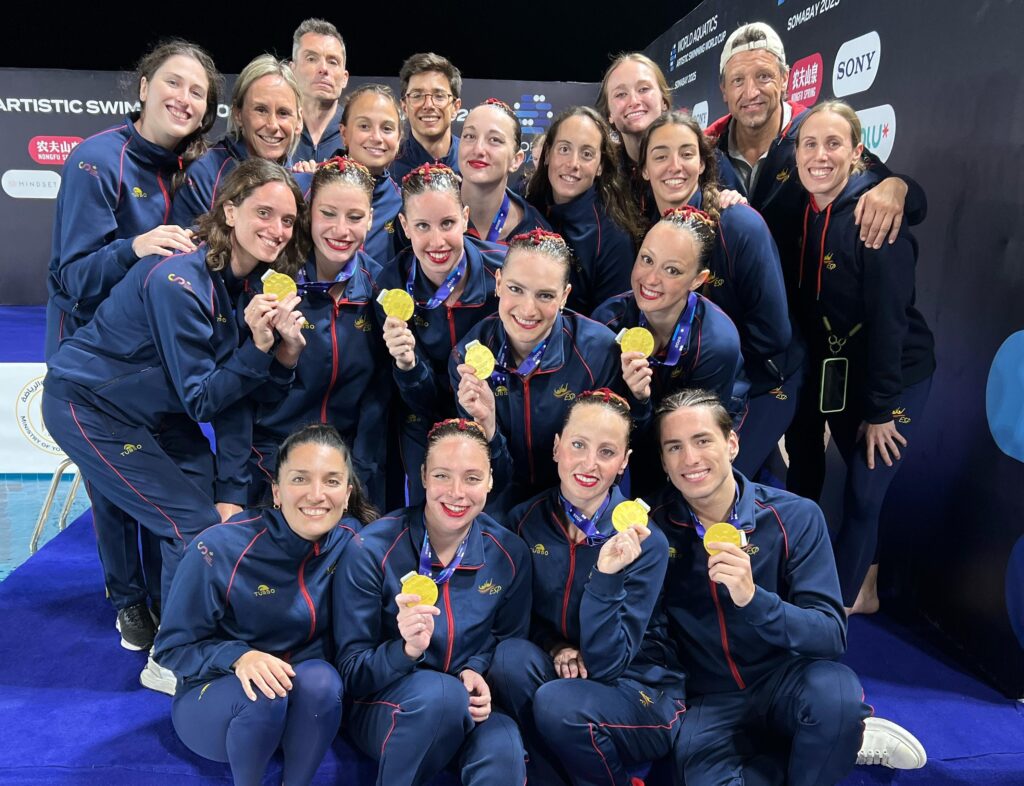
IS: What has kept you motivated all these years to stay at the top?
TM: I was also thinking about this last year: “Why have you been here all these years (laughs)?” The most important thing for me was to be in an Olympic Games, to swim as best as we could, and to win a medal.
In 2012, I was too young and not part of the Olympic team. In 2016 for Rio, we didn’t qualify at all. It was a very hard moment. At that time, I was actually thinking of giving up, but then I tried to be a hard worker again and to fight for my dream to go to the Olympics.
But then, COVID-19 came. It was really hard too, we had to wait five years for the next Games. Finally, we qualified, but when we went to Tokyo… Yes it was the Olympics, but nobody was cheering for us. The pool was empty, we really couldn’t enjoy the experience as much as we thought.
So then I thought I only had three more years for the next one, and that maybe I could achieve my goal then. I felt fine, physically and mentally, and I still had the power to fight for this dream with my team. The last year before the Paris Olympics was really difficult, but finally we could qualify.
And then, I was suddenly the flyer of the team. Even though I never did a jump in my life before (laughs). But I said, “Okay, let’s do this!” I would come one hour before training started and work with Judit [Requena, assistant coach] to learn how to fly. I had a little bit of anxiety with all of this, of course, but I took it as a new challenge and an opportunity for me to learn something different.
But then I broke one rib, and I had to stop for a month and a half. That was very stressful because the Olympics were three months away. I was thinking that somebody would take my place in the team if I was injured, so it was a little bit traumatic. But it was all fine, and I was a flyer for the first time in my career at the Olympics, it’s crazy. I did it, even though I still don’t know how (laughs)! Sometimes, we really are capable of doing more things than we think.
I remember the last day in Paris was amazing. We just knew that it was our moment, that we had to fight until the end. We really connected with each other as a team. We only had to look each other in the eyes, do our power pose, and we all knew. That feeling is really magical. I don’t know if I will feel it again someday in my life. It’s difficult to feel that outside of sports.
Personally, that last day, I was also thinking about all of these years before, all the hard work I did to arrive here. I remember that day, I woke up thinking “Okay, today is my day. I will do it and I will enjoy it, because that’s why I am still here.”
So yes, we enjoyed ourselves a lot in Paris, that was my first goal there. Because you know, nobody’s telling me that I have to do this. I’m here because I want to, so I have to enjoy it as much as possible.
IS: Would you say the Paris Olympics were your most memorable moment in your career?
TM: Yes, that moment, the Olympic medal, and also because all my family and friends were there. I remember when we walked out on the deck, I couldn’t even hear my teammate who was counting because it was so loud. It was really exciting.
There’s also the World Championships in 2013 in Barcelona, at home. That was a really memorable moment for me too, because they were my first ones and I was the youngest one. It felt surreal. And again, all of my family and friends were there. For me, it’s really important to feel all my people, to know they are there with me.
And then, the gold medal in the World Championships in 2023 in the technical team was a very meaningful moment as well. This is when we realized that we could dream it, and we could do it. It was really powerful and it gave us a lot of confidence for the Olympic year.
IS: After the 2016 season and the team’s missed Olympic qualification, a lot of your teammates retired and left. But you stayed on and became the new team captain.
TM: Yes, it was really special. All of the sudden, I was the oldest one on the team in such a short time. Sometimes, it felt like I was back in the junior team (laughs). A lot of them were 16, 17, but I wasn’t really old either. So yes, I found myself the most experienced on the team at only 21, and I became the team captain.
It was really difficult for me at first, but the younger ones were really powerful and happy, always with a lot of energy. It made it a lot easier, and I really enjoyed starting over with them. I believe my degree in psychology was really helpful during that time as well. For example, I did some classes on leadership, which helped me step up to this new role and responsibility.
I think, I hope, I have done everything I could in the most difficult moments, just like in the best moments. Being a captain, you have to be there not only in the good times, but also, and most importantly, in the bad times.
You are the person who has to talk with the coach, or maybe do whatever you have to do to help the team. I always try to unite the team and support good values like communication, confidence and trust. They know that if they need something, they can tell me, and I will do what I can to help them.
IS: Do you see yourself staying involved in the sport whenever your athletic career is over?
TM: Yes, I want to. I have a lot of experience now, and I can help other athletes who maybe are just starting and need some help. I would love to provide that for them. I will start a master of sports psychology as well, to have both.
For me, clinical psychology was very important because we are people first, not only athletes. And sometimes we forget a little bit about this part, so it’s really important to remind everyone that. To be able to have both degrees in sports and clinical psychology could be very great for the future.
IS: Reflecting on your career and everything you’ve learned, is there something that you’d like to say to younger athletes?
TM: First, the most important thing is to enjoy. It’s true that you can’t enjoy everything all the time (laughs)! There are also hard moments, some difficulties, and unexpected situations. But it makes you a stronger athlete. You also have to remember that you have the whole team to support you, just like you support them when they have sad or hard days. It’s really beautiful to share this whole experience together.
Also, hard work is very important. When I was younger, I wasn’t the best athlete of my year at all, and maybe I didn’t have the best conditions to be in the national team at first. But I worked a lot, I still am working hard every day to be here. Hard work, and having a strong mindset are very important. Then, you can achieve some goals that you would never imagine, inside and outside of the pool.
Txell Mas is a two-time Olympian and Olympic bronze medalist in the team event. She is also a seven-time world medalist (1G, 4S, 2B) and eight-time European medalist (3G, 1S, 4B). Throughout her career, she has swam in seven World Championships and six European Championships. She will compete next at the upcoming European Championships in Funchal, Portugal.
ARTICLE BY CHRISTINA MARMET
Photos: Courtesy of Meritxell Mas, and Deepbluemedia
If you’ve enjoyed our coverage, please consider donating to Inside Synchro! Any amount helps us run the site and travel costs to cover meets during the season.

